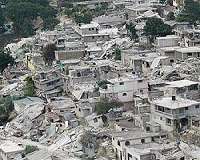| . |  |
. |
Port-Au-Prince (AFP) Feb 16, 2010 In Haiti's slums, gang leaders who escaped from prison in January's earthquake are trying to wrest back control of their turf, sparking a bloody power struggle that the UN fears could destabilize the country. UN troops are beefing up operations in Port-au-Prince after 5,000 prisoners escaped from jail on January 12, as fears grow that the convicts are swelling the ranks of the country's once-powerful gangs and seeking top positions. "My understanding is that they are trying to reorganize themselves, trying to establish a kind of kingdom for themselves inside the slums," UN force commander Floriano Peixoto told AFP. "To establish that, they need to fight with each other. This is what we don't want," he said. Already, there are UN reports that in the city's worst slums, former prisoners have caused a surge in violence and upset the status quo. The chaos wrought by the quake has also made access to weapons easier. Some gang leaders have gone into hiding, others have been shot or hacked to death. Just five years ago, Haiti's gangs, some politically-linked, controlled swathes of the capital, were responsible for innumerable murders and made kidnapping endemic. Robert Perito of the US Institute of Peace warned in a recent report that the gangs could best the Haitian police and UN forces when the United States withdraws its 10,000-plus troops from the country, if reinforcements are not brought in. Before the quake, the gangs had been all but wiped out thanks to a UN offensive that took effect by 2007. Peixoto wants to make sure that progress is not rolled-back. He will soon get 900 more Brazilian troops to work road blocks, increase patrols and be a visible deterrent to the gangs. "The strategy is to deter, to tell them 'do not show up, because if I see you, I catch you'." One place that gang members do show up is Port-au-Prince's most notorious slum, Cite Soleil. In the heart of the sprawling mass of corrugated iron and breeze blocks is Strong Point 16, a heavily fortified UN military compound that is home to around 120 troops. Inside, under floodlights, a dozen heavily-armed Brazilian soldiers mounted their vehicles for one of the night patrols that take place every two hours in this sector. The soldiers are from second company of BRABAT, a Brazilian battalion that makes up the bulk the UN peacekeeping mission in Haiti. They eased out into the darkness, which is punctuated only by a handful of candles and a paraffin lamp here and there. Even before the earthquake there was little electricity in Cite Soleil. As they edge through the slum, each vehicle has one soldier training his weapon on the road in front, while two monitor the sides and one soldier with a pump-action shotgun guards the rear. In an area from which gangs have been largely cleared, they dismounted from the vehicle, got in formation and began a short walk in the back streets of the slum. Immediately, shoeless children greeted them shouting "boa noite" and singing Capoeira tunes. Looking around, the group's senior officer said things are less friendly down the road, where the patrol is about to head. Back in the vehicle, the Brazilians began to circle the outskirts of an area of Cite Soleil known as Boston. The joking and laughing disappeared and the soldiers strained to see into the darkness of the slum. The area's gang, also called Boston, has been increasingly active since the quake, and is blamed for murders, thefts, drug-running, rapes and protection rackets. A couple of days ago, according to the UN patrol commander, shots were fired near his troops, causing backup to be called in and security procedures to be stepped up. For the UN, the area is now terrain for armored tanks. Much of the recent violence is thought to be linked to a power struggle between rival leaders Toutouba and adversaries Gro Pouchon, Ti Blan and Bazou. The three members of the latter alliance have been seen armed in broad daylight and locals believe a hit is being planned. Although Peixoto admits he does not know what these gang leaders and others who escaped from prison are up to exactly, he said the general aim is clear. "I don't know what they want to do, the only thing that I know is that they try to establish areas, impose their presence, to establish controls." "My intent is not to give them any kind of freedom to act," he said.
Share This Article With Planet Earth
Related Links Bringing Order To A World Of Disasters A world of storm and tempest When the Earth Quakes
 Rebuilding Haiti could cost up to 14 billion dollars: IDB
Rebuilding Haiti could cost up to 14 billion dollars: IDBWashington (AFP) Feb 16, 2010 Rebuilding Haiti could cost 14 billion dollars, making last month's quake the most destructive natural disaster in modern history, the Inter-American Development Bank (IDB) said Tuesday. The stark assessment came after a 7.0-magnitude-quake leveled parts of the Caribbean nation of nine million, already the poorest in the Americas before the disaster. The quake killed at least 217,000 people ... read more |
|
| The content herein, unless otherwise known to be public domain, are Copyright 1995-2010 - SpaceDaily. AFP and UPI Wire Stories are copyright Agence France-Presse and United Press International. ESA Portal Reports are copyright European Space Agency. All NASA sourced material is public domain. Additional copyrights may apply in whole or part to other bona fide parties. Advertising does not imply endorsement,agreement or approval of any opinions, statements or information provided by SpaceDaily on any Web page published or hosted by SpaceDaily. Privacy Statement |